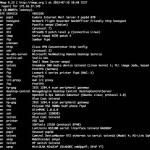Article by: Kerry Blake Apache is the most widely used Web server on the Internet. It was developed to work in Unix environment, but was ported to other server operating system like Windows. The Apache web server serves millions of websites and web-applications. A wide range of authentication schemes and a lot of language interfaces […]
Linux Security: How to hide processes from other users
Small and at the same time great article from Steve on http://www.debian-administration.org/. — If you run a multi-user system it can increase security if you hide the display of running processes, and their arguments, which belong to other users. This helps avoid problems if users enter passwords on the command-line, and similar.
SSH in 2 steps on Linux with Google Authenticator
Article by Alessio bash, first published on his blog Many security policies require you to change the port number of the SSH service to ensure greater security in a Linux system. Situation now used throughout the IT world and used mostly by users who have their own private server. Today I want to show you […]
PortSpoof – An interesting anti-snooping tool for Linux
Fool those who try to portscan your system! The Portspoof program is designed to enhance OS security through emulation of legitimate service signatures on otherwise closed ports. It is meant to be a lightweight, fast, portable and secure addition to the any firewall system or security infrastructure. The general goal of the program is to […]
How to Really Secure Your Linux VPS SSH Service
Article By Stanton Levens Let face it, the Secure Shell (SSH) daemon running on your VPS is the most sensitive service open to attack on your system. Any hacker worth their salt will first try to gain access to your VPS via SSH and 99.9% of all VPS connected to the internet run this service by […]


